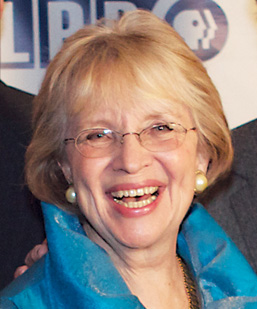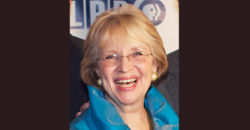Q&A: Beth Courtney
Published: March 8, 2016
Last Updated: June 1, 2016

In 2015, Beth Courtney marked her 30th year as the president and CEO of Louisiana Public Broadcasting. The LEH will celebrate her career with a Lifetime Achievement Award on April 7, 2016 at the 2016 Bright Lights Awards Dinner. LEH Executive Director Miranda Restovic spoke to her about her career.
[/box]You’re a long-time Baton Rouge resident, but your roots are in North Louisiana. Can you tell us about your childhood?
I was born in Shreveport, Louisiana, but I am definitely a military brat. My mother was from Shreveport, my father from Logansport. We always knew we were from Louisiana wherever we lived, but I grew up moving all around the world. My father was a general and in the Air Force and we lived in Hawaii and London and Naples, Italy, and Washington D.C. any number of times and Biloxi, Mississippi, where he was commander of Keesler [Air Force Base]. From there I went to LSU for college.
You began your career in broadcasting as a political correspondent reporting on state government in Baton Rouge and moderating political debates. What drew you to that work?
I’ve always been fascinated with power and politics, I suppose. I was working on a Masters in European history when I was at LSU, and a fellow classmate of mine went to work for NPR. He said, “Beth, while you’re doing this, why don’t you go up to the Capitol? They’re looking for somebody to do some radio reports, and I know you can ask anyone questions about anything and you’re not afraid of being around new situations.”
I went up to the Capitol in 1972 with two tape recorders. I plugged in over in the House of Representatives and figured out how to produce stories in morning and afternoon drive. It was the most fascinating time because Governor [Edwin] Edwards had just been elected and all sorts of changes were taking place in Louisiana. Remember, I’m a history major, really. I just thought it was so interesting, and I believed in the mission of sharing with the public what was going on. I’ve been hooked on that ever since.
Louisiana politics are famous and infamous. What is a standout memory from your days as a correspondent?
I remember visiting the office of Representative Shady Wall, who did not like Bill Lynch, an investigative reporter at the time working for the States-Item. I got up to leave, and Wall opened a desk drawer and he had a gun in it. He chased me down the hall, and I ran into the pressroom and phoned the governor’s mansion and asked to speak to the governor.
I said, “I’m going to be shot by Representative Wall.” He started laughing and said, “No, that’s not going to happen. That’s not going to happen. It’s going to be okay.” Representative Wall ended up giving me some peaches from Ruston to apologize for his behavior. I don’t think I’ve ever shared that story with anyone before.
You’ve seen and moderated many gubernatorial debates. Is there one that stands out that was particularly tough?
The most controversial debate we ever did here was the one when David Duke was running for governor [in 1991]. We probably had a hundred threats or so coming in about even doing the debate. We had reporters at our station from around the world…because they were following David Duke. Now, I was fairly confident that David Duke was not going to win, but even asking those questions was very important. I had a unique insight into David Duke. He was in one of my classes when I was the graduate assistant. I had a grade book and he had a D-minus, I might add, in the class.
Consequently, we did not ask him the usual questions that he was expecting from people about the KKK or something like that because he had those answers down pat. What we asked him was, “You’re running for governor. Who are the major employers in the state of Louisiana?” Just very basic. He had no answers. None. I think that—in many ways—indicated who he was, as opposed to just the superficial following the story for headlines.
Under your leadership, LPB has produced numerous award-winning documentaries, including Uncle Earl, Kate Chopin: A Reawakening, and Frame After Frame: The Images of Herman Leonard. This is a commitment that LEH and LPB share. Why documentaries?
Documentaries in Louisiana are important historically, important for education, but also we have the most extraordinary stories, most fascinating individuals, and I think they are a fertile field for us to be developing. I also think that very few people produce documentaries in the public sector.
Documentaries allow us to nurture filmmaking capabilities in areas other than reality television, which of course, as we know, is not reality. I think the actual historical facts are far more compelling than anything you would make up.
Your record as a cultural leader is remarkable and admirable. What advice do you have for the new generation of leaders in this sector?
My father, who passed away recently at 99, always looked forward. He went from open cockpits to landing a man on the moon in jets in his lifetime, but he was never looking back. He was always looking forward. That’s one of the pieces of advice I would have for future leaders, and that is look at the possibilities. I’m sometimes naïve in that I’m always an optimist. I always try and look at the things that are the best about the opportunity you have. I can go to a meeting or go to a gathering of people and I’ll come away with three or four ideas automatically. I think I’ve always retained that zest and enthusiasm for what you do… If you have that, then you are very fortunate.
The other piece of advice I would give you is to always surround yourself with great people because if you have talented people that work with you, they make you look good. Finally, you have to treat your volunteers well, the people that work with you out of the goodness of their hearts. Always pay attention to your boards of directors. If you do that, then you’re in good shape.
